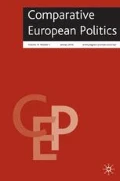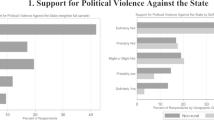Abstract
Scholars have long conceptualized unions and left parties as powerful and independent social actors within national systems of the political economy. Yet a unique survey of more than 2300 German Social Democratic Party (SPD) activists provides new insights into the relationship of two, in fact, deeply intertwined organizations. Factor analysis followed by multivariate regression of the survey results reveal two distinct dimensions of alienation that occur among party activists as they evaluate trade unions. ‘Content alienation’ picks up on differences in political goals among unions and the SPD. Meanwhile, ‘contact alienation’ builds on scepticism about union inclination or capacity. Novel data establish the magnitude and distribution of these two forms of alienation as measured by individual-level attitudes, which, in turn, have implications for debates on comparative political economy, political parties and corporatism. They suggest also sources of resilience and stability in German capitalism, notwithstanding important levels of alienation inside the party over trade union goals and methods.


Similar content being viewed by others
Notes
Similarly, from the perspective of union leaders, the birth of new parties on the left, such as the Greens and Die Linke, creates new options to choose from and thus makes de-alignment from the SPD less costly.
Moreover, the meltdown of the Green Party from over 20 per cent approval in summer 2013 to 8.5 per cent certainly added to what would otherwise have been a more desultory result.
See EIRO-online; http://www.eurofound.europa.eu/eiro/2003/02/inbrief/de0302104n.htm
We thank an anonymous reviewer for this point.
sozialtechnokratische Modellbastelei ohne politische Erdung.
The software did allow for interrupting the survey and completing it later.
Because of German privacy law, the party could not transfer its email list to researchers but could only facilitate the research by forwarding the survey. This led to some minor complications. For example, the survey was limited to one follow-up reminder, where two is considered preferable without overburdening recipients (Hall et al, 2009, p. 511).
We excluded responses where individuals did not answer more than the first five out of 48 questions.
Historically, union membership in Germany went up as workers aged, before falling again as they neared retirement after age 60. Thus, some of our younger respondents might be expected to join unions at a later date. However, Schnabel and Wagner (2005) found that in Germany age was positively correlated with union membership until about 1992, after which this relationship seems to have disappeared (p. 19). That may imply that our very low numbers in the youngest cohort reflect a shift in which young party members are less likely to join unions later.
As far as unions’ stance on welfare state reform, respondents who consider unions an obstacle could theoretically come from two different camps: critics from the left, who feel unions inhibit moves towards a more generous welfare state, and critics from the right, who feel that unions are a barrier to putatively necessary welfare state retrenchment. While we cannot rule out such a multidirectional interpretation of this interview item, we consider it unlikely. At the time of our survey, there was not a popular counter model of welfare state reform from the left. The public discourse on welfare state issues closely associated welfare reform with retrenchment and not with expansion. We thank an anonymous reviewer for making us aware of this alternative interpretation.
Our data have two other limitations. First, while we measure the alienation of any given sub-group of SPD members against a reference group, we do not have left-right measures of the sign of this alienation. One sub-group could be alienated to the right of the unions while a second sub-group might be alienated to the left. In other work (Behrens and Jacoby, 2014), we take up this issue with a comparison of SPD respondents in the public sector – a group often held to be to the right of union leadership – in comparison to other groups such as the 1968ers. One implication of that work is that even high levels of alienation might be organizationally stable, as they pull in different directions. Second, and for similar reasons, it is possible that a given sub-group might contain polarized views about unions – on either contact or content dimensions – that cancel each other out and register as a position close to that of the union. The concern is that we might underestimate the amount of alienation. Our response is that we do have good measures of total alienation (47 per cent), which do not suggest that the movement is teeming with ‘extra’ alienation that we are not picking up on in the sub-groups.
We used principle component analysis with varimax rotation.
To the extent classical theories of corporatism look at these questions, this seems to be the implicit view of how union members navigate their dual loyalties.
AfA: Arbeitsgemeinschaft für Arbeitnehmerfragen; AGS: Arbeitsgemeinschaft Selbständige.
We thank an anonymous reviewer for this suggestion.
Clearly, our analysis also found many areas in which party activists see unions in positive terms as well.
References
Allen, C. (2009) Empty nets: Social democracy and the ‘catch-all party’ thesis in Sweden and Germany. Party Politics 15 (1): 635–653.
Allern, E. and Bale, T. (2012) Political parties and interest groups: Disentangling complex relationships. Party Politics 18 (1): 7–25.
Behrens, M. and Jacoby, W. (2014) Competing activists in a ‘composite party’: Unions and the public sector in the German SPD. Working Paper, Hans-Böckler-Stiftung.
Burgess, K. (2004) Parties and Unions in the New Global Economy. Pittsburg: University of Pittsburg Press.
Chang, L. and Krosnick, J. (2009) National surveys via RDD telephone interviewing versus the internet. Public Opinion Quarterly 73 (4): 641–678.
Dillman, D., Smyth, J. and Christian, L.M. (2009) Internet, Mail, and Mixed-mode Surveys: The Tailored Design Method. Hoboken, NJ: Wiley.
Duverger, M. (1959) Political Parties: Their Organization and Activity in the Modern State, 2nd edn. London: Methuen.
Ebbinghaus, B. (1995) The Siamese twins: Citizenship rights, cleavage formation, and party-union relations in Western Europe. International Review of Social History 40 (Supplement 3): 51–89.
Egle, C. and Zohlnhöfer, R. (2007) Ende das rot-grünen Projektes: Eine Bilanz der Regierung Schröder 2002–2005. Wiesbaden, Germany: VS.
Esping-Andersen, G. (1985) Politics against Markets: The Social Democratic Road to Power. Princeton, NJ: Princeton University Press.
Friedrich, D. (2008) Für ein neues Verhältnis von Gewerkschaften und SPD. Perspektiven ds 25 (1): 31–37.
Gohr, A. and Seeleib-Kaiser, M. (2003) Sozial – und Wirtschaftspolitik unter Rot-Grün. Wiesbaden, Germany: VS.
Hale Williams, M. (2008) Kirchheimer revisited: Party polarisation, party convergence, or party decline in the German party system? German Politics 17 (2): 105–133.
Hall, T., Monson, J.Q. and Patterson, K. (2009) The human dimension of elections: How poll workers shape public confidence in elections. Political Research Quarterly 62 (3): 507–522.
Hassel, A. and Trampusch, C. (2006) Verbände und Parteien: Die Dynamik von Parteikonflikten und die Erosion des Kapitalismus. In: J. Beckert, B. Ebbinghaus, A. Hassel and P. Manow (eds.) Transformation des Kapitalismus. Frankfurt, Germany: Campus, pp. 111–132.
Häusermann, S. (2010) The Politics of Welfare State Reform in Continental Europe: Modernization in Hard Times. New York: Cambridge University Press.
Howell, C. and Daley, A. (1992/1993) Introduction: The transformation of political exchange. International Journal of Political Economy 22 (4): 3–16.
Hyman, R. and Gumbrell-McCormick, R. (2010) Trade unions, politics, and parties: Is a new configuration possible? Transfer 16 (3): 315–331.
Jacoby, W. (2000) Imitation and Politics: Redesigning Modern Germany. Ithaca, NY: Cornell University Press.
Katz, R. and Mair, P. (1995) Changing models of party organization and party democracy: The rise of the cartel party. Party Politics 1 (1): 5–28.
Katz, R. and Mair, P. (2009) The cartel party thesis: A restatement. Perspectives on Politics 7 (4): 753–766.
Kirchheimer, O. (1966) The transformation of West European party systems. In: J. LaPalombara and M. Weiner (eds.) Political Parties and Political Development. Princeton, NJ: Princeton University Press.
Kitschelt, H. (2004) Political-economic context and partisan strategies in the German federal elections 1990–2002. In: H. Kitschelt and W. Streeck (eds.) Germany: Beyond the Stable State. London: Frank Cass, pp. 118–144.
Kitschelt, H. (2012) Parties and interest intermediation. In: E. Amenta, K. Nash and A. Scott (eds.) The Wiley-Blackwell Companion in Political Sociology. Hoboken, NJ: Wiley-Blackwell, pp. 144–157.
Klein, M. (2011) Wie sind die Parteien gesellschaftlich verwurzelt? In: T. Spier et al. (eds.) Parteimitglieder in Deutschland. Wiesbaden, Germany: Verlag für Sozialwissenschaften, pp. 39–60.
Klecha, S. (2007) Personelle Distanzen und verbliebene programmatische Anknüpfungspunkte. Perspektiven ds 24 (1): 90–101.
Korpi, W. (1983) The Democratic Class Struggle. London: Routledge & Kegan Paul.
Korpi, W. (1985) Economic growth and the welfare state: A comparative study of 18 OECD countries. Labour and Society 10 (2): 195–209.
Markovits, A. (1986) The Politics of the West German Trade Unions. Strategies of Class and Interest Representation in Growth and Crisis. Cambridge: Cambridge University Press.
Meyer, T. (2004) Die agenda 2010 und die soziale gerechtigkeit. Politische Vierteljahresschrift 45 (2): 181–190.
Michels, R. (2001) Political Parties. Kitchner, Canada: Batoche Books.
Mielke, G. (2003) Adieu les enfants. Berliner Republik 3, http://www.b-republik.de/archiv/adieu-les-enfants.
Nachtwey, O. (2013) Market social democracy: The transformation of the SPD up to 2007. German Politics 22 (3): 235–252.
Niedermayer, O. (2006) Die Wählerschaft der Linkspartei. PDS 2005: sozialstruktureller Wandel bei gleich bleibender politischer Positionierung. Zeitschrift für Parlamentsfragen 37 (3): 523–538.
Olson, J. (2007) The merger of the PDS and WASG: From Eastern German regional party to national radical left party? German Politics 16 (2): 205–221.
Olson, M. (1982) The Rise and Decline of Nations: Economic Growth, Stagflation, and Social Rigidities. New Haven, CT and London: Yale University Press.
Patton, D. (2011) Out of the East: From PDS to Left Party in Unified Germany. Albany, NY: SUNY Press.
Piazza, J. (2001) De-linking labor: Labor unions and social democratic parties under globalization. Party Politics 7 (4): 413–435.
Poguntke, T. (2002) Parties without firm social roots? Party organisational linkage. In: K.R. Luther and F. Müller-Rommel (eds.) Political Parties in the New Europe: Political and Analytical Challenges. Oxford: Oxford University Press.
Rhodes, M. (2001) The political economy of social pacts: Competitive corporatism and European welfare reform. In: P. Pierson (ed.) The New Politics of the Welfare State. Oxford: Oxford University Press.
Schmidt, R. (2003) Der gescheiterte Streik in der ostdeutschen Metallindustrie. Prokla 33: 493–509.
Schnabel, C. and Wagner, J. (2005) Determinants of trade union membership in West Germany: Evidence from micro data, 1980–2000. Socio-Economic Review 3 (1): 1–24.
Schneider, M. (1989) Kleine Geschichte der Gewerkschaften: Ihre Entwicklung in Deutschland von den Anfängen bis heute. Bonn, Germany: Dietz Nachfolger.
Schroeder, W. (2005) Sozialdemokratie und Gewerkschaften. Berliner Debatte Initial 16 (5): 12–21.
Schroeder, W. (2008) SPD und Gewerkschaften: Vom Wandel einer privilegierten Partnerschaft. WSI Mitteilungen 61 (5): 231–237.
Silvia, S. (1992/1993) The forward retreat: Labor and social democracy in Germany, 1982–1992. International Journal of Political Economy 22 (4): 36–52.
Silvia, S. (2013) Holding the Shop Together: German Industrial Relations in the Postwar Era. Ithaca, NY: Cornell University Press.
Streeck, W. (2009) Re-forming Capitalism: Institutional Change in the German Political Economy. Oxford: Oxford University Press.
Streeck, W. (2005) Nach dem Korporatismus: Neue Eliten, neue Konflikte. Cologne: Max-Planck-Institut für Gesellschaftsforschung Working Papers.
Taylor, G., Mathers, A. and Upchurch, M. (2011) Beyond the chains that bind: The political crisis of unions in Western Europe. Labor History 53 (3): 287–305.
Upchurch, M., Taylor, G. and Mathers, A. (2009) The Crisis of Social Democratic Trade Unionism in Western Europe: The Search for Alternatives. Farnham, UK: Ashgate.
Van Biezen, I., Mair, P. and Poguntke, T. (2012) Going, going … gone? The decline of party membership in contemporary Europe. European Journal of Political Research 51 (1): 24–56.
Walter, F. (2002) Die SPD: Vom Proletariat zur Neuen Mitte. Berlin, Germany: Alexander Fest.
Author information
Authors and Affiliations
Corresponding author
Rights and permissions
About this article
Cite this article
Jacoby, W., Behrens, M. ‘Breaking up is hard to do’: German trade unions within the Social Democratic Party. Comp Eur Polit 14, 273–297 (2016). https://doi.org/10.1057/cep.2014.29
Published:
Issue Date:
DOI: https://doi.org/10.1057/cep.2014.29




